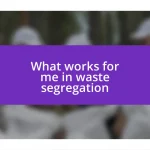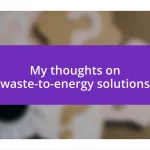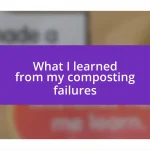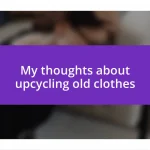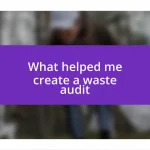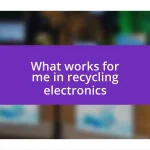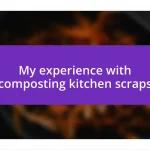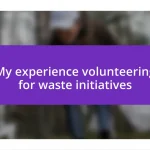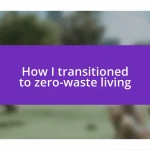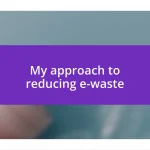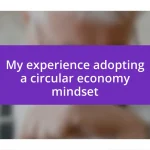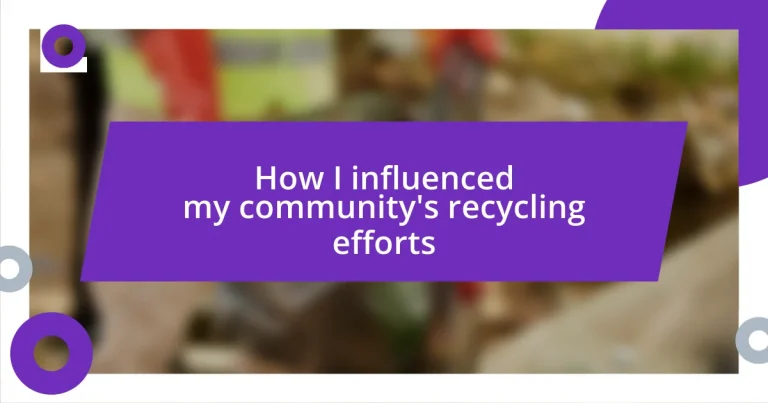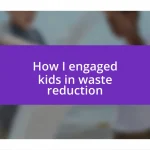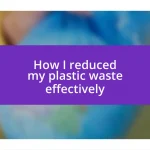Key takeaways:
- Community education is crucial for improving recycling participation and understanding what materials are recyclable.
- Engaging activities like hands-on workshops, social media challenges, and local business collaborations can effectively promote recycling awareness.
- Consistent follow-up, celebrating milestones, and encouraging ongoing involvement strengthens long-term commitment to recycling within the community.
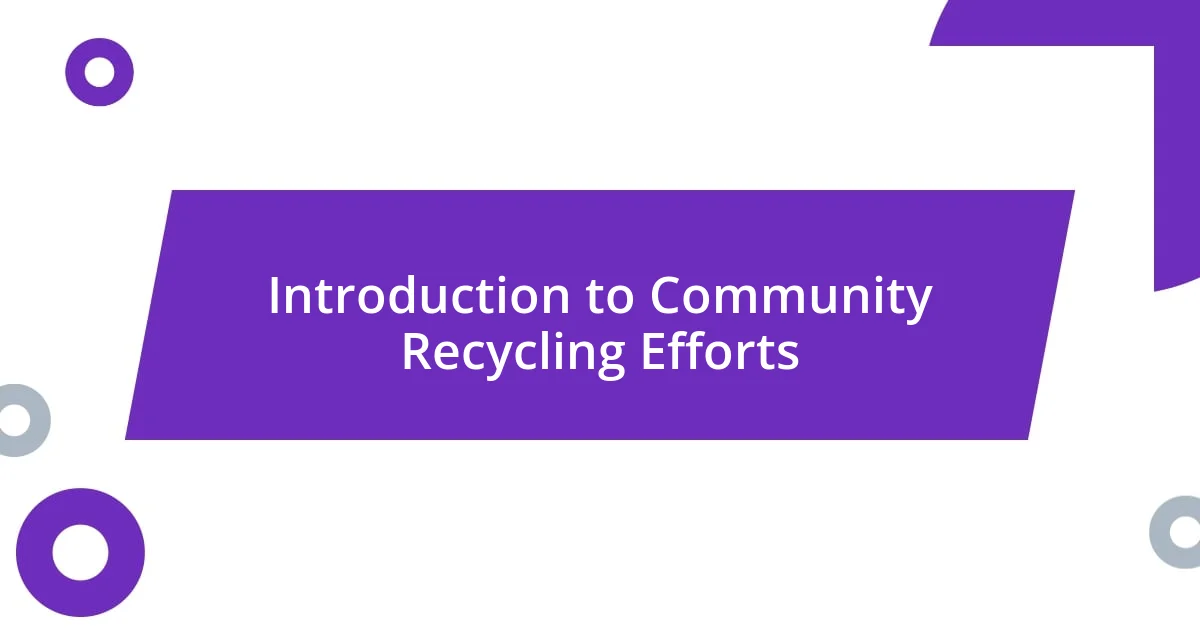
Introduction to Community Recycling Efforts
Recycling in our communities is more than just a practice; it’s a movement powered by passion and shared responsibility. I remember the first time I participated in a community clean-up—seeing so much waste lying around made me realize how crucial our collective efforts are. Isn’t it heartbreaking to think about the impact our waste has on the environment and future generations?
As I delved deeper into the world of recycling, I was struck by how many people were unaware of what can and cannot be recycled. Just the other day, a neighbor expressed confusion about whether pizza boxes were acceptable in the bins. Such moments remind me that education is key; when we understand the ‘why’ and ‘how’ behind recycling, we’re more likely to engage in these efforts.
Moreover, involving the younger generation in recycling initiatives has the potential to create lasting change. At a local school event, I witnessed children eagerly sorting recyclable materials, their curiosity contagious. Could there be a better way to inspire lifelong advocates for our planet? This shared experience not only strengthens our community ties but also plants the seeds for a sustainable future.
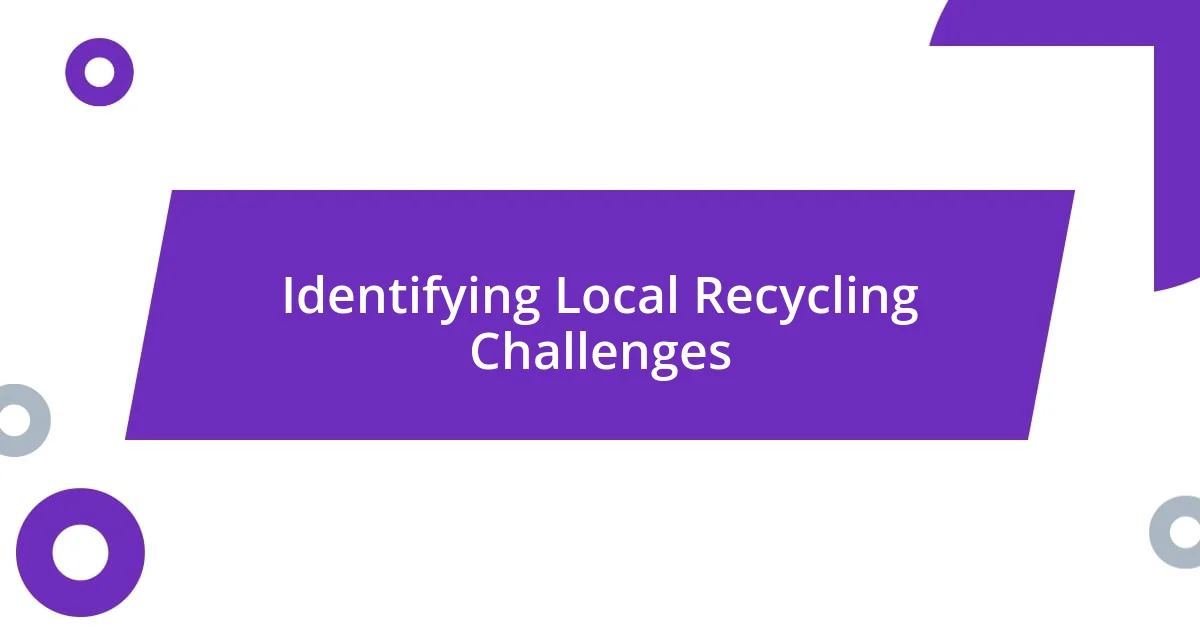
Identifying Local Recycling Challenges
Identifying local recycling challenges requires a keen understanding of what hinders effective participation. I remember attending a town hall meeting where residents voiced concerns about the lack of clear guidelines. It was eye-opening to hear from passionate community members who genuinely wanted to help but felt overwhelmed by confusion.
Key challenges we’ve identified include:
- Unclear Recycling Guidelines: Many residents simply don’t know what materials are recyclable.
- Insufficient Access to Recycling Facilities: In some neighborhoods, recycling bins are scarce or poorly maintained.
- Low Engagement Levels: Busy lifestyles lead to a lack of time and interest in proper recycling practices.
- Contamination Issues: Contaminated recyclables make processing difficult and often lead to entire batches being sent to landfills.
- Limited Education Campaigns: There’s a noticeable gap in outreach, especially for new residents or families with young children.
Addressing these issues is essential for strengthening our community’s recycling efforts. Each challenge presents an opportunity for change, and recognizing them is the first step towards creating a more effective recycling program.
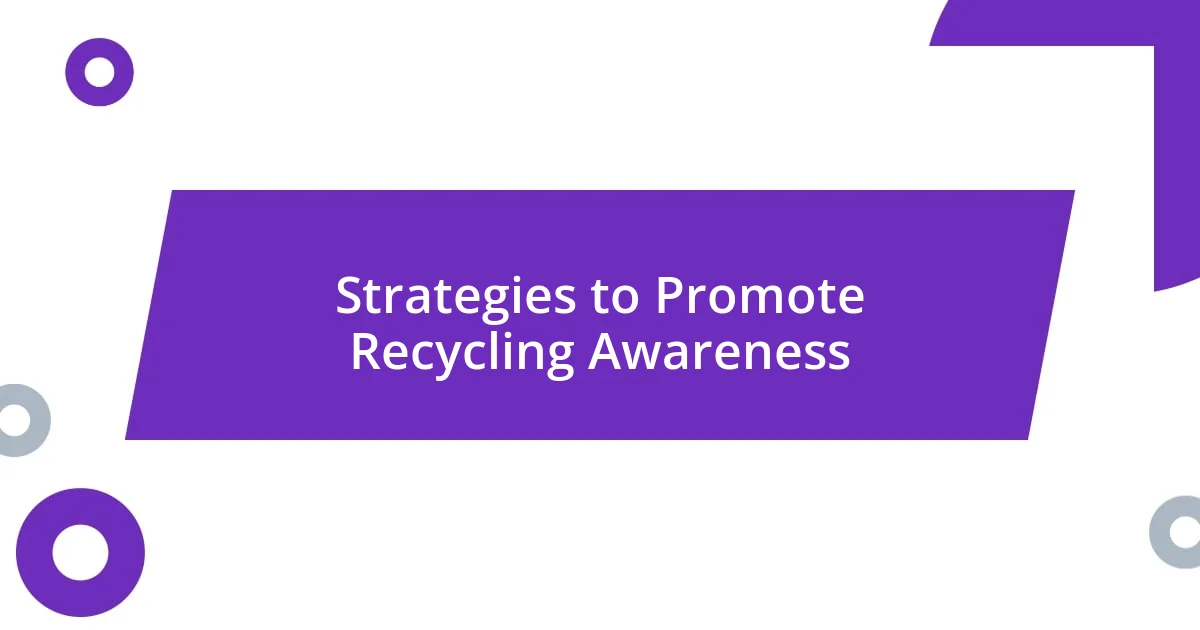
Strategies to Promote Recycling Awareness
When it comes to fostering a recycling culture in our communities, I found that hands-on workshops can be incredibly effective. I organized a weekend event where residents could bring their recyclables and learn proper sorting techniques. Watching people excitedly engage with one another, sharing tips and asking questions, really highlighted how interactive learning can break down barriers of confusion. Have you ever seen someone light up after realizing they were doing something wrong for so long? It’s inspiring to know they’ll take that knowledge back home.
In addition to workshops, leveraging social media has proven to be a game changer. I started a dedicated group where we share success stories, recycling tips, and even host friendly challenges. The more I posted, the more I noticed neighbors participating and showing off their own efforts. It’s not just about recycling; it’s about creating a community rallying behind a shared goal. Have you considered how social media can amplify your voice? I believe it’s an invaluable tool in today’s world.
Collaborating with local businesses can also ignite recycling initiatives. I approached a local café, and they graciously agreed to host a “Recycle and Sip” day, offering discounts to customers who brought their recyclables. The response was overwhelming; people lined up, holding their items and chatting about their own recycling goals. It’s a vivid reminder that sometimes, making recycling fun can encourage people to step up. Have you thought about unique partnerships in your area that could make a difference?
| Strategy | Description |
|---|---|
| Hands-On Workshops | Interactive sessions where residents learn about recycling practices and sorting techniques. |
| Social Media Engagement | Utilizing platforms to share stories, tips, and challenges to create a sense of community. |
| Local Business Collaborations | Partnering with businesses to offer incentives for recycling, making it a fun community event. |
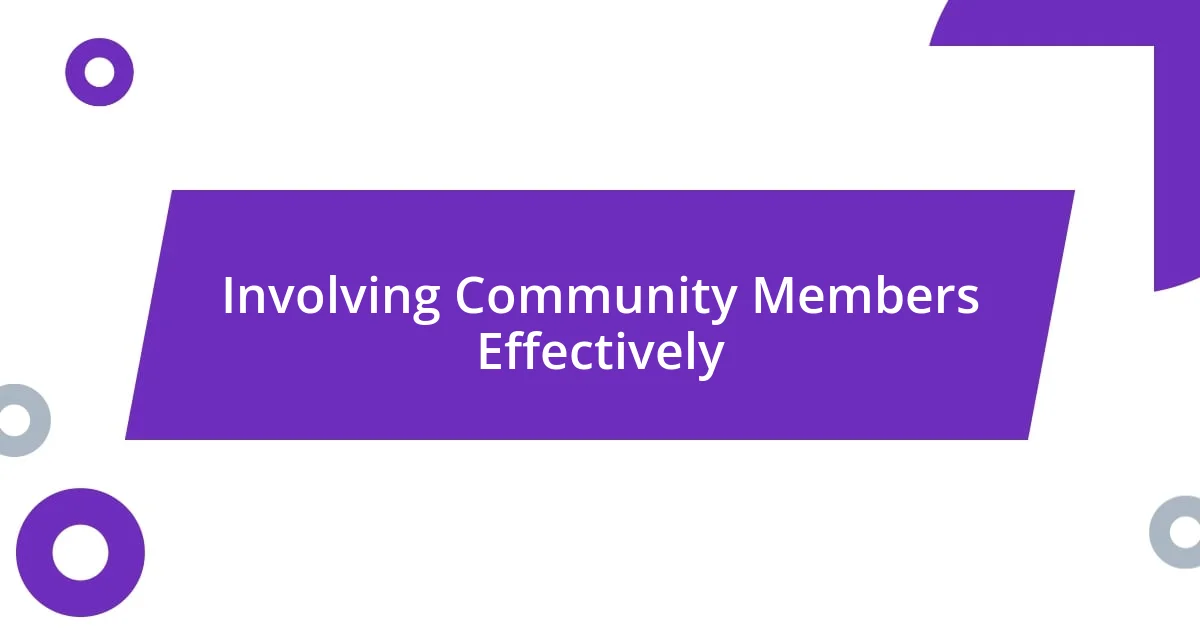
Involving Community Members Effectively
Getting community members involved effectively is all about creating meaningful connections. I remember one Saturday morning, armed with just a few posters and a passion for recycling, I set up a small booth at our local farmers’ market. As the sun warmed the day, people began to gather. I could see their curiosity peeking through; they wanted to learn more. Engaging with them face-to-face allowed me to share stories, answer questions, and watch their eyes light up with newfound knowledge. Isn’t that an incredible way to spark change?
I also found that tapping into existing community events can yield amazing results. During our annual community picnic, I proposed a “Recycling Bingo” game, where participants could win small prizes for correctly identifying recyclable items. The laughter and excitement created an atmosphere where education felt natural rather than forced. I often thought, how can we make learning fun, and this was definitely one way that felt right. Plus, it fostered collaboration among attendees, turning strangers into allies in the recycling effort.
Finally, I can’t stress enough the importance of showcasing real-life success stories. After helping a neighbor transform their backyard into a composting area, I shared their journey in our neighborhood newsletter. The feedback was phenomenal; people reached out, motivated to start their own projects. I found it so rewarding to see that personal touch resonate with others. Have you ever felt that spark of inspiration when hearing about someone’s journey? It reminded me how effective storytelling can be in rallying a community around shared values and goals.
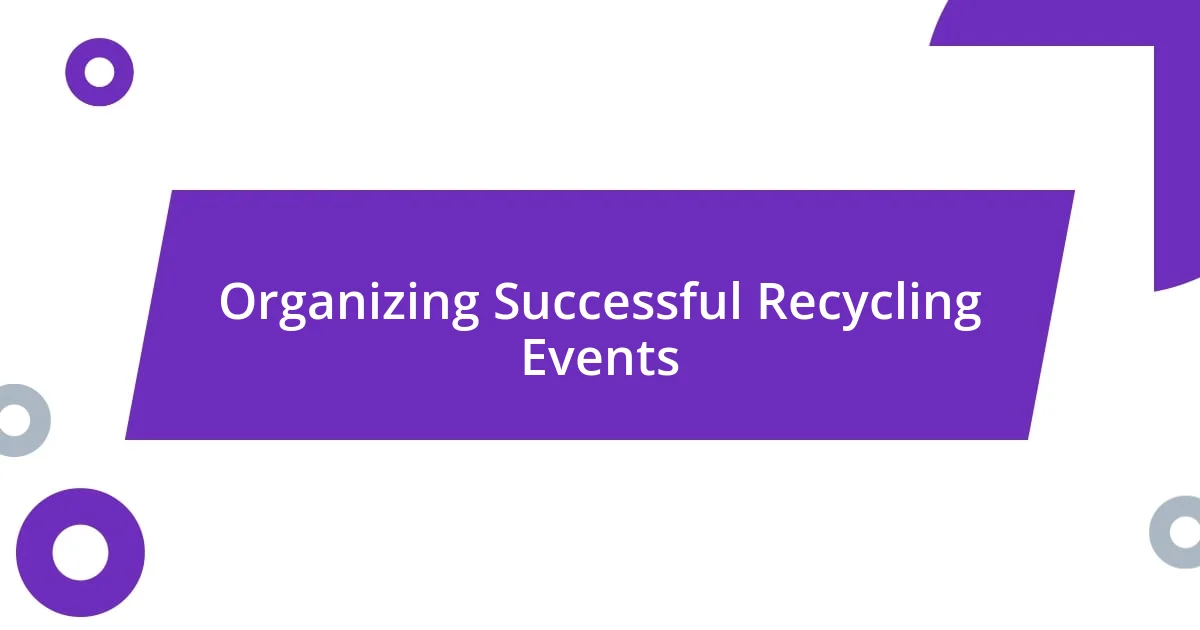
Organizing Successful Recycling Events
Organizing successful recycling events can feel like putting together a puzzle, but each piece is crucial for the whole picture. I vividly remember our first community clean-up event—it started with just a handful of friends. We teamed up to clean up a nearby park, and as we sorted through the trash, many passersby stopped to see what we were doing. To my surprise, several joined in! There’s something magical about people witnessing action; it often sparks their curiosity and motivates them to participate. Have you experienced that sense of connection when you bring people together for a shared purpose?
In my experience, picking the right time and location for events makes a world of difference. For instance, I chose a sunny Saturday morning at our local park for our recycling drive, coinciding with a popular community yoga class. The ambiance was electric! People flowed in and out, helped by the already vibrant energy of the class. As they dropped off recyclables, many stayed to chat about sustainable practices and further engage with our initiatives. Have you considered how the right setting can boost participation? It can transform an ordinary event into an unforgettable experience.
I also believe that incorporating fun activities can enhance engagement. For one of our events, I organized a “recycling relay race” where families teamed up to compete in sorting different items into the correct bins. Each participant’s smiles and laughter were contagious, making it not only educational but a joyful experience. Witnessing families cheer each other on made me realize that making recycling enjoyable can have a lasting impact. Have you thought about how fun elements can transform your community events into lively gatherings?
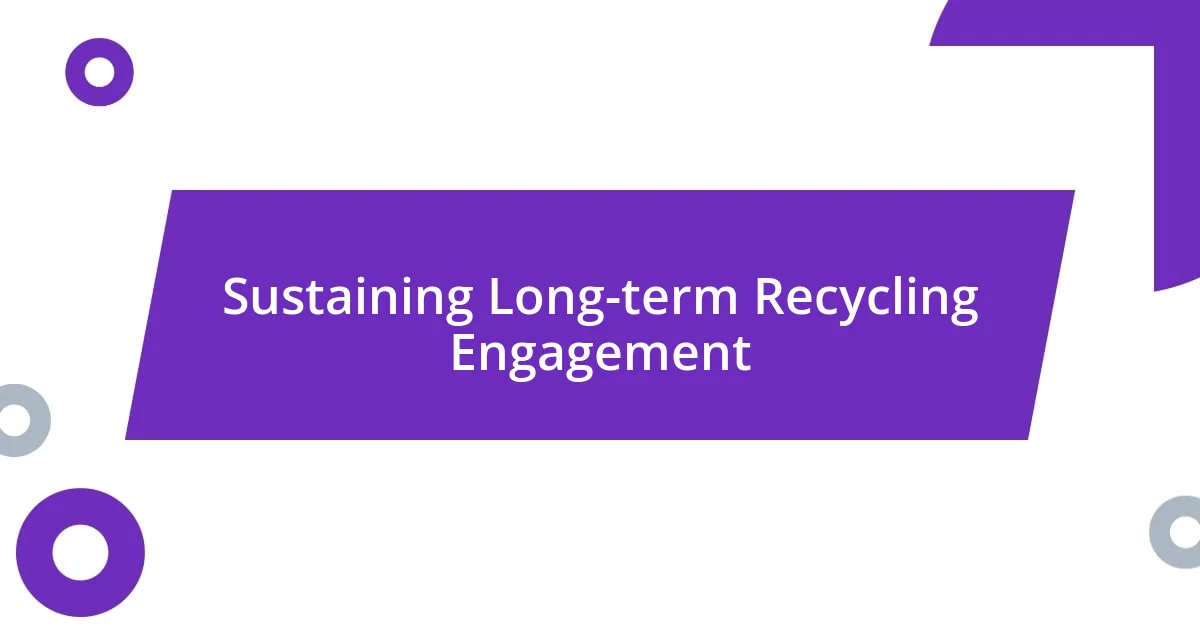
Sustaining Long-term Recycling Engagement
Sustaining long-term engagement in recycling initiatives requires a consistent and personal touch. One strategy that has worked for me is to create a monthly recycling challenge in our neighborhood. Each month, I’d send out a simple flyer highlighting a different focus area, like reducing plastic use or composting. Witnessing neighbors share their progress on social media brought such motivation and camaraderie. Have you ever felt that sense of accountability when you’re part of something bigger?
I also make it a point to regularly check in with community members after events. I recall a woman who attended our initial recycling drive and later reached out to me, wanting guidance on recycling at her workplace. It was such a heartwarming moment to see her passion. Providing ongoing support not only fosters commitment but also reinforces the idea that recycling is a shared journey. Isn’t it inspiring to see individuals grow within their community?
Moreover, I believe celebrating milestones, no matter how small, keeps the momentum going. When our neighborhood collectively reached a goal of recycling a set amount of waste, we organized a small gathering to celebrate. It was a beautiful evening filled with laughter, storytelling, and a sense of achievement. Reflecting on that night, I realized that acknowledging our efforts not only reinforces our commitment to sustainability but also strengthens our community bonds. Have you ever celebrated a collective accomplishment that made you feel even more connected to those around you?
